Way back in 2003, I reviewed the Quill
Mouse, which its developer, Torbay Holdings Inc., described as the
"world's first biomechanically engineered computer mouse" designed to
help minimize Repetitive Strain Injury (RSI).
The Quill Mouse
The marquee feature of the Quill Mouse was that it was "gripless"
(i.e.: it let users move the cursor without gripping the mouse), so
your hand could remain relaxed while you maneuvered initiating tracking
motion from your elbow and shoulder rather than your wrist and fingers.
This, of course, takes some getting used to, and it is not as precise
for small detail work as are fine motor movements of the hand and
wrist, but it is less stressful and more comfortable once you get
acclimatized.
Gripping pointing devices is potentially related to development of
discomfort and even injury in computer users' necks, shoulders, arms,
and hands as well as tension in deep neck muscles, leading to symptoms
such as headaches radiating from the neck area, neurological tingling
and/or numbness in arms and hands, reduced head mobility, and blood
flow restriction.
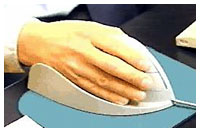 The Quill also oriented the
user's hand into the "handshake position", removing wrist twist and
thereby "unwinding" the median nerve. The "handshake" position also
guides the user into keeping the forearm at the same height as the
mouse, with the unit's "button mound" meeting and supporting the
forefinger and palm of the hand comfortably. The heel of the hand, the
wrist, and the forearm rest in the channel or "wrist and arm guide",
with the thumb free to float or rest on the outside of the button
mound.
The Quill also oriented the
user's hand into the "handshake position", removing wrist twist and
thereby "unwinding" the median nerve. The "handshake" position also
guides the user into keeping the forearm at the same height as the
mouse, with the unit's "button mound" meeting and supporting the
forefinger and palm of the hand comfortably. The heel of the hand, the
wrist, and the forearm rest in the channel or "wrist and arm guide",
with the thumb free to float or rest on the outside of the button
mound.
The Quill worked. I still have both right- and left-handed Quills,
and they are extremely comfortable, low stress pointing devices to use,
especially when my polyneuritis is flaring up.
You can
still buy essentially the same design mouse, now renamed Aero2bic. The
$99.95 Aero2bic mouse is available in both right- and left-handed
versions from aerobicmouse.com.
The Handshoe Mouse
However, there's a brand new player in the "gripless" mouse category
- the Handshoe
Mouse Ergonomic Mouse from Hippus NV of the Netherlands. Designed
by a Dutch medical university with two years of field testing and
refinement, this product - like the Quill Aero2bic - can help minimize
stress associated with devices that must be gripped while orienting the
mousing hand and arm in more ergonomically sound posture.
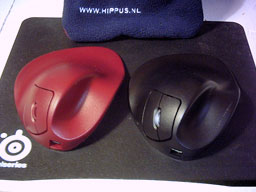 Medical and ergonomic specialists at Holland's Erasmus
University Medical Centre used electromyogram (EMG) technology to
measure the muscle activity of hand and fingers when mousing. They
found that relaxation in neck, shoulders, arms, and hands can be
realized by reducing force exerted during mouse manipulation.
Medical and ergonomic specialists at Holland's Erasmus
University Medical Centre used electromyogram (EMG) technology to
measure the muscle activity of hand and fingers when mousing. They
found that relaxation in neck, shoulders, arms, and hands can be
realized by reducing force exerted during mouse manipulation.
Introduced to the North American market last fall, the Hippus
Handshoe Mouse's marketing focus is centered on the 25% of the
computer-using workforce estimated to be suffering some degree of RSI
symptoms.
With a
shape that reminds me of a Manta Ray fish, this is a large mouse that
will require a generously-sized mouse pad - with gaming pads like the
SteelSeries SteelPad units I use being an ideal choice.
While the Handshoe Mouse design shares conceptual commonalities with
the older Quill/Aero2bic design, it is also different in a number of
ways, with a lower-profile, a not as vertically-oriented button mound,
and a contoured thumb rest area on the back side of the mound.
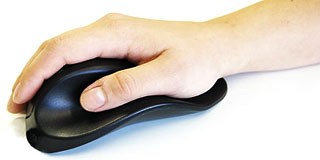 In form factor the Handshoe is wider than the Quill/Aero2bic,
but not as long. On both products, your hand rests entirely in a
contoured channel on the top of the mouse, with no friction from
contact with the mousing surface.
In form factor the Handshoe is wider than the Quill/Aero2bic,
but not as long. On both products, your hand rests entirely in a
contoured channel on the top of the mouse, with no friction from
contact with the mousing surface.
There is
also no need to use fingertips for pressing the mouse buttons - small
exertion of finger pressure from the big joint where it meets the hand
is sufficient for button clicking. Button action is a nice compromise
between low effort and positive feedback, while the scroll wheel can be
operated with the inside of the middle or index finger. Scroll wheel
action is detented, which falls short of the excellence one finds in
the weighted scroll wheels of some Logitech mice whose detents can be
enabled or disabled to allow freewheeling (the latter being my personal
preference in most instances).
Because the Handshoe Mouse is designed to fit your hand like a
glove, it must be able to accommodate different hand sizes and comes in
both left- and right-hand versions. There are are six different
variations offered, with hand sizes (left and right) corresponding to
hands measured from the tip of the ring finger to the wrist crease in
large (210 mm or 8.25"), medium (190 mm or 7.5"), and small sizes (170
mm or 6.75"). Left-hand sizes are manufactured on demand and cost up to
four times the price of right-hand versions. When ordering a Handshoe
Mouse, it's recommended that you measure your hand
according to instructions posted on the Hippus and reseller
Websites and order the appropriate size. The largest-size Handshoe
Mouse also has a third button with the same function as the switch
function of the scroll wheel, but the small and medium sizes don't have
room to accommodate this third button.
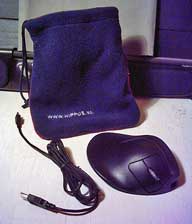 Handshoe Mouse mice are available in both wireless and corded
versions. I tested only corded models, which is what I prefer in mice
for their greater precision and positive connection interface,
especially large units like these that are less likely to be taken on
the road with a laptop, although they do come with nice fleece
drawstring carry-bags.
Handshoe Mouse mice are available in both wireless and corded
versions. I tested only corded models, which is what I prefer in mice
for their greater precision and positive connection interface,
especially large units like these that are less likely to be taken on
the road with a laptop, although they do come with nice fleece
drawstring carry-bags.
Despite their size, the Handshoe Mouse is commendably light in
weight, and according to Hippus' Canadian distributor it can even be
rendered slightly lighter, if desired, by removing metal and plastic
ballast weights housed in the mouse enclosure. The weights, located in
the outer chamber of the underside, are specifically included by
default to allow the user to reduce the weight of the mouse for users
(of which I'm one) who prefer lighter weight mice, The medium sized
Handshoe Mouse models we tested weighs about 210 grams in standard
weighted trim.
I tested a
standard optical tracking sensor Handshoe Mouse in optional red livery
and a black example of Hippus' new BlueRay Track model - both of them
medium sized models. The BlueRay Track model unit, with its BlueRay
Track Engine, is based on a double lens optical system in combination
with a blue LED and a specific light frequency that supports a far
higher definition of the underlying surface, resulting in a higher
accuracy on a broader range of surfaces and tangibly better in pointing
precision and "feel". I found it works on almost any surface without a
mouse pad. For example, it tracks perfectly on glass and with
acceptable precision even on my trouser-leg or a blanket.
"This new cutting edge BlueRay Track technology will take the
Handshoe Mouse forward in a different league, where ergonomic and
technological claims can be proven and supported by research and field
reports," says Hippus' Chief Technical Officer, Dr. Ing. Paul Helder.
Certainly in testing the laser and BlueRay Handshoe Mouse models
back-to-back, the BlueRay unit has a definite precision edge, although
the laser model is no slouch either. The BlueRay Track models are also
expected to be especially attractive to serious gamers, who require
extremely high definition.
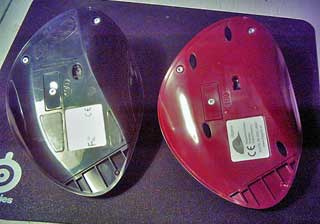 Both models are pretty much identical in
form-factor, although the BlueRay Track unit does incorporate some
evolutionary improvements in addition to the more sophisticated sensor
technology, such as the size of its glide pads, which provide roughly
three times the total contact area of the standard Handshoe Mouse's
pads, making for significantly smoother and lower-effort tracking,
although both are comfortably low-effort units. The scroll wheel
detents on the BlueRay Track Handshoe Mouse also had a better feel, but
that might've just been a production variation.
Both models are pretty much identical in
form-factor, although the BlueRay Track unit does incorporate some
evolutionary improvements in addition to the more sophisticated sensor
technology, such as the size of its glide pads, which provide roughly
three times the total contact area of the standard Handshoe Mouse's
pads, making for significantly smoother and lower-effort tracking,
although both are comfortably low-effort units. The scroll wheel
detents on the BlueRay Track Handshoe Mouse also had a better feel, but
that might've just been a production variation.
The Handshoe Mouse is plug and play, with no special drivers for Mac
or PC needed, and some Low End Mac users will be gratified to hear that
OS 9 is supported. While these mice are not inexpensive and I
think the scroll wheel action could be improved, the designers have
achieved their objective in creating a comfortable, low-stress pointing
device. If you suffer from mousing pain, they should prove well worth
the price.
Low End Mac rating: 3.5 out of 4.
Dimensions
- Large: 5.375" W x 7.25" D
- Medium: 4.875" W x 6.625" D
- Small: 4.5" W x 5.875" D
Hand sizes:
- Large: 8.25" or 210 mm
- Medium: 7.5" or 190 mm
- Small: 6.75" or 170 mm
Weight (both wired and wireless)
- Large: 250 g
- Medium: 200 g
- Small: 120 g
Buttons
- 2 for small and medium
- 3 for large
Connection specs.:
- USB 1.1 (compatible with USB 1.1 and USB 2.0)
- Separate USB connection on the Handshoe Mouse
- Battery wireless version is charged with USB cable
Controls:
- Two buttons at ergonomic position plus scroll wheel
- Scroll wheel Fitted with switch
Control mechanism
- Standard: 800 dpi
- BlueRay Track: 1000 dpi
Wireless Version Specs:
- Poll rate (Hertz) of the electronics is 113~118 Hz and up to 120
Hz.
- Wireless range of the receiver is 10 m
- Receiver / dongle is fitted with a LED light which goes on and off
when operating the mouse.
- The wireless Handshoe Mouse uses a lithium ion battery which can
only be removed by professional service providers.
- Battery life is around 2 years.
- Operating time for the wireless version is around 4 weeks.
- Charging of the wireless version takes around 3 hours.
- Charging takes place by means of USB cable; The PC or laptop needs
to be switched on during charging.
One can continue working while charging the battery; the micro
receiver/dongle must be in place.
Warranty: 2 years
Operating systems supported:
- Mac OS 9 or Mac OS X
- Windows 95, 98, 2000, NT, XP or Vista
- Unix
Current US price: USB, $99, wireless, $119; BlueRay (USB), $109,
wireless, $129
In Canada, the Handshoe Mouse currently sells for C$110 (USB) and
C$130 (cordless). The BlueRay sells for C$120 (USB) and C$140
(cordless)
Get a free
download of the research presentation of Erasmus University.
Handshoe Mouse is available in the US from:
- Ergo Works, Inc.
- 420 Olive Avenue
- Palo Alto, CA 94306
-
http://www.askergoworks.com/category/1/Ergonomic+Keyboards+and+Mice.aspx?Brand=988
- Tel: +1 650-322-9775
- Fax: +1 650-322-9770
In Canada:
- Micwil Group of Companies
- Ergonomics Portal: ErgoCanada.com
- 102 Wheeler Street
- Saskatoon, SK S7P 0A9
- Canada
- http://tinyurl.com/yfsj7m6
- Tel: (306) 382-5995,
- Fax: (306) 382-4995
- Toll Free: (866) 335-3746 (ERGO)

 The Quill also oriented the
user's hand into the "handshake position", removing wrist twist and
thereby "unwinding" the median nerve. The "handshake" position also
guides the user into keeping the forearm at the same height as the
mouse, with the unit's "button mound" meeting and supporting the
forefinger and palm of the hand comfortably. The heel of the hand, the
wrist, and the forearm rest in the channel or "wrist and arm guide",
with the thumb free to float or rest on the outside of the button
mound.
The Quill also oriented the
user's hand into the "handshake position", removing wrist twist and
thereby "unwinding" the median nerve. The "handshake" position also
guides the user into keeping the forearm at the same height as the
mouse, with the unit's "button mound" meeting and supporting the
forefinger and palm of the hand comfortably. The heel of the hand, the
wrist, and the forearm rest in the channel or "wrist and arm guide",
with the thumb free to float or rest on the outside of the button
mound. Medical and ergonomic specialists at Holland's Erasmus
University Medical Centre used electromyogram (EMG) technology to
measure the muscle activity of hand and fingers when mousing. They
found that relaxation in neck, shoulders, arms, and hands can be
realized by reducing force exerted during mouse manipulation.
Medical and ergonomic specialists at Holland's Erasmus
University Medical Centre used electromyogram (EMG) technology to
measure the muscle activity of hand and fingers when mousing. They
found that relaxation in neck, shoulders, arms, and hands can be
realized by reducing force exerted during mouse manipulation. In form factor the Handshoe is wider than the Quill/Aero2bic,
but not as long. On both products, your hand rests entirely in a
contoured channel on the top of the mouse, with no friction from
contact with the mousing surface.
In form factor the Handshoe is wider than the Quill/Aero2bic,
but not as long. On both products, your hand rests entirely in a
contoured channel on the top of the mouse, with no friction from
contact with the mousing surface. Handshoe Mouse mice are available in both wireless and corded
versions. I tested only corded models, which is what I prefer in mice
for their greater precision and positive connection interface,
especially large units like these that are less likely to be taken on
the road with a laptop, although they do come with nice fleece
drawstring carry-bags.
Handshoe Mouse mice are available in both wireless and corded
versions. I tested only corded models, which is what I prefer in mice
for their greater precision and positive connection interface,
especially large units like these that are less likely to be taken on
the road with a laptop, although they do come with nice fleece
drawstring carry-bags. Both models are pretty much identical in
form-factor, although the BlueRay Track unit does incorporate some
evolutionary improvements in addition to the more sophisticated sensor
technology, such as the size of its glide pads, which provide roughly
three times the total contact area of the standard Handshoe Mouse's
pads, making for significantly smoother and lower-effort tracking,
although both are comfortably low-effort units. The scroll wheel
detents on the BlueRay Track Handshoe Mouse also had a better feel, but
that might've just been a production variation.
Both models are pretty much identical in
form-factor, although the BlueRay Track unit does incorporate some
evolutionary improvements in addition to the more sophisticated sensor
technology, such as the size of its glide pads, which provide roughly
three times the total contact area of the standard Handshoe Mouse's
pads, making for significantly smoother and lower-effort tracking,
although both are comfortably low-effort units. The scroll wheel
detents on the BlueRay Track Handshoe Mouse also had a better feel, but
that might've just been a production variation.
